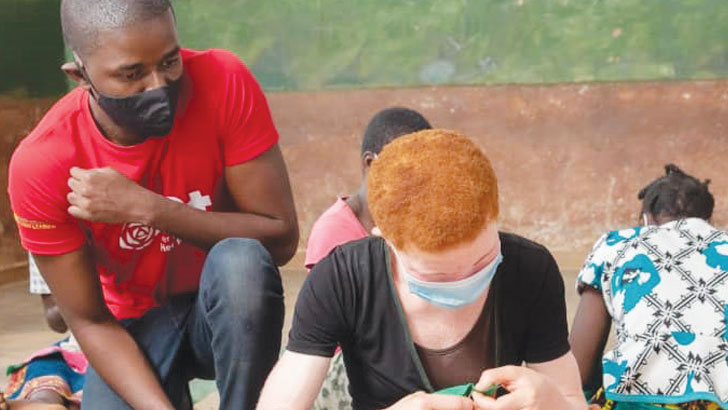Pads for menstrual equality
A 20-year-old student disguised as Grace was jeered by her classmates when she menstruated in class at Kaliyeka Secondary School in Lilongwe.
The disgraced girl felt uncomfortable to return to school and stayed home for a whole school term, afraid to face her classmates.
“I decided not to go to school again after that embarrassment. When I returned to school, I couldn’t attend classes anymore when the monthly periods started,” states the girl, who stays with her grandmother.
Grace uses old clothes as she cannot afford sanitary pads.

Her schoolmate, Mirriam Msiska, 24, sknows the agony faced by schoolgirls during menstruation.
She says most of the girls choose to stay home—missing classes— when the monthly periods kick in.
“Due to poverty, stigma and misconceptions of menstruation, girls are forced to miss classes,” she says. “Some girls even fall into risky sexual relationships in search of money to buy basics such as pads.”
For Mirriam, the risky decisions poor girls make expose them to sexually transmitted infections, teen pregnancy and child marriage.
“It’s a challenging decision, but it is poverty that pushes them into the trap of finding a boyfriend or a sugardaddy to support them,” she says.
Mirriam and Grace were excited when Her Period, Her Pride trained 10 adolescent girls with disability at Muloza Primary School in sewing reusable sanitary pads using locally available resources.
Peter Mndalasini, the founder of the project, says the initiative targets adolescent girls and young women with disability to leave no one behind.
“It is difficult for young women with disability to access sanitary pads. By empowering them to make reusable pads when they need them, we believe this will help them close the gap,” he says.
The training also includes resource mobilisation skills.
Mndalasini, a Women Deliver Young Leader fellow of 2020, says lack of menstrual hygiene props is frustrating efforts to keep menstruating girls in school.
“We are protecting poor girls’ dignity so they don’t get disgraced by failure to achieve their menstrual hygiene,” he says.
Mndalasini feels the burden is higher in rural areas where 84 in every 100 people in Malawi live.
“Most parents in the rural areas cannot set aside K800 for their daughters’ sanitary pads. Their priority is food. As such, most learners stop schooling due to lack of basics,” he explains.
Her Period, Her Pride urges the government and its partners to start distributing sanitary pads free of charge to adolescent girls and young women who miss school for four to five days every month when menstruation begin.
Its project coordinator Elina Mwasinga is happy that the training is bearing the desired fruit.
“Previously, the schools used to register a lot of girl absentees during menstruation periods, but now the number is falling,” she explains.
Minister of Gender, Community Development and Social Welfare Patricia Kaliati commends Her Period, Her Pride for coming to the rescue of poor girls excluded from education by the biological process which occurs every month.
She says the reusable sanitary pads from locally available materials will ease access to the basic protective wear among vulnerable girls and young women.
“This is important project in promoting the welfare of a girl child. Indeed, there is a lot we have to do together with other stakeholders to address the gaps in menstrual hygiene, especially among poor girls and young girls,” says Kaliati.
Her Period, Her Pride has trained 200 adolescent girls and young people since last December. The project is funded by Women Deliver.






One Comment